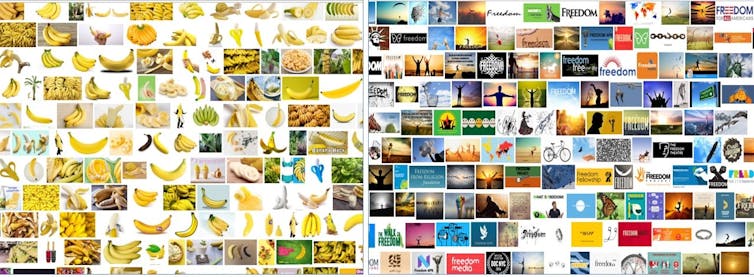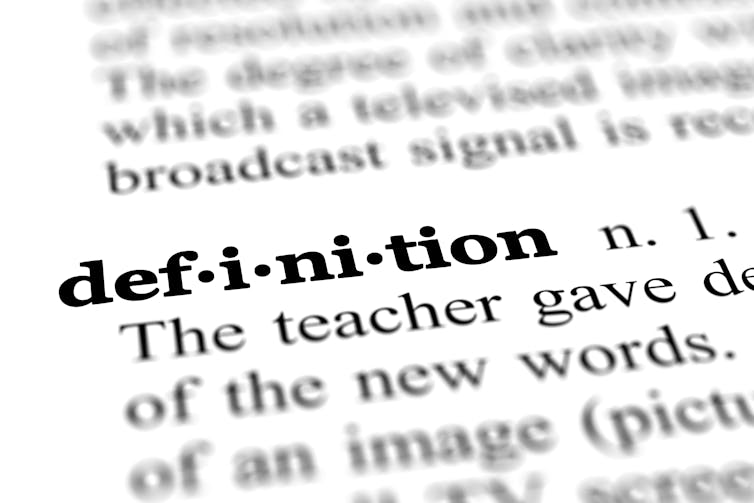How language shapes your thoughts – what researchers knowJ
Mama_Po/Shutterstock.com
Marianna Bolognesi
Words work as a glue, allowing us to group together different experiences under one label. This is especially true for concepts that we cannot see or touch. But we still don’t really understand how language works in shaping the meaning of these more abstract concepts, or how it allows us to group experiences together under one “umbrella” term, which denotes something we cannot point to, or see, or touch.
Concrete concepts such as “banana” and abstract ones such as “freedom” differ in many ways. To get a grasp of this difference, Google the words “banana” and “freedom” and compare the images that are returned by the browser. For “banana” you get pictures that are quite similar to one another. For “freedom”, on the other hand, you get very different types of images that apparently have little in common. Screenshots of Google Image searches using ‘banana’ and ‘freedom’ as keywords. Google, Author provided
Screenshots of Google Image searches using ‘banana’ and ‘freedom’ as keywords. Google, Author provided
The difference between concrete and abstract concepts has been researched by a large body of scientific studies. This research has demonstrated that concrete concepts are far more easily learned and remembered than abstract ones. Clinical studies conducted on patients with damages in specific brain areas reveal that some patients lose the ability to understand and recall abstract concepts but not concrete ones. This is because abstract and concrete concepts are processed in different, although overlapping, brain areas.
Despite these documented differences, and despite the fact that around 70% of the words we use on a daily basis designate abstract concepts, most scientific theories that address the big question of how language works in the brain are based on analyses of words denoting concrete concepts only.
It’s obvious why. Imagine that an alien came from outer space and wanted to learn your language. You could show her a banana while spelling the word “banana”, and after a few times the connection might stick to the alien’s memory. But how would you teach her the meaning of “freedom”?
It turns out that explaining how our daily experiences shape the meaning of concepts is important. For concrete concepts, this works fairly well: colours, shapes, textures, flavours, sounds, smells and everything that we perceive through our bodies contribute to shape the meaning of concrete concepts. But what colour or shape does “freedom” have? What type of experience can represent the meaning of “freedom”? If our bodily experiences don’t contribute directly to shape the meaning of abstract concepts, then what are abstract concepts even made of? What is it exactly that gives concepts their meaning? Toncsi/Shutterstock.com
What is it exactly that gives concepts their meaning? Toncsi/Shutterstock.com
What are concepts made of?
A great academic debate revolves around this topic. There are two main schools of thought: what is termed “grounded cognition” and then what we call “symbolic cognition”. Both views assume that we understand and represent all concepts according to the same underlying principles, be they concrete or abstract. The difference, they argue, may lie in the type of information that these concepts convey.
The grounded cognition camp predicts that when we hear the word “banana”, we automatically activate information about colour, taste, texture and so on in our mind, derived from our previous experiences with bananas. For “freedom”, they argue that we would still activate instances or situations in which we experienced “freedom”, but the focus would now be on the emotions that such experiences triggered, and on the dynamics between the elements that populate such situations, rather than on the perceptual properties of the entities involved.
The symbolic cognition camp, on the other hand, suggests that concepts are represented in our mind through symbols that are not tied to our experiences. According to this view, when we hear “banana”, we do not simulate anything that derives from our previous experiences. Instead, we understand its meaning by aggregating bits of information via abstract symbols (such as the zeroes and the ones inside a computer). According to this view, the mind operates on mental symbols like a bodyless computer, without reenacting every time previous experiences with these concepts. This would be the case for both concrete and abstract concepts.
A third way
There’s a problem with both of these approaches though. Given the vast differences between concrete and abstract concepts, as we saw above, surely it shouldn’t be surprising if they were processed in different ways in our mind.
My recent research suggests that the meanings of “banana” and “freedom” may consist of blends of information that we retrieve from different channels. In particular, while perceptual experiences constitute the main ingredient of the meaning of “banana”, language is the main ingredient to bake up the meaning of “freedom”. And language is a powerful tool that can be used to bend, invent and change experiences.
As humans, we construct meaning using language. Words are not just labels that we attach to concepts and ideas that are manipulated and combined at a deeper cognitive level. Words construct meaning and allow us to form, combine and elaborate complex thoughts that would otherwise be impossible to handle.
While concrete concepts are mainly made of information derived from perceptual experience, abstract concepts are mainly made of language. And as such, abstract concepts represent the highest and most sophisticated achievement in the evolution of language, and probably a major turning point in the evolution of humankind.
www.fotavgeia.blogspot.com
Mama_Po/Shutterstock.com
Marianna Bolognesi
Words work as a glue, allowing us to group together different experiences under one label. This is especially true for concepts that we cannot see or touch. But we still don’t really understand how language works in shaping the meaning of these more abstract concepts, or how it allows us to group experiences together under one “umbrella” term, which denotes something we cannot point to, or see, or touch.
Concrete concepts such as “banana” and abstract ones such as “freedom” differ in many ways. To get a grasp of this difference, Google the words “banana” and “freedom” and compare the images that are returned by the browser. For “banana” you get pictures that are quite similar to one another. For “freedom”, on the other hand, you get very different types of images that apparently have little in common.
 Screenshots of Google Image searches using ‘banana’ and ‘freedom’ as keywords. Google, Author provided
Screenshots of Google Image searches using ‘banana’ and ‘freedom’ as keywords. Google, Author providedThe difference between concrete and abstract concepts has been researched by a large body of scientific studies. This research has demonstrated that concrete concepts are far more easily learned and remembered than abstract ones. Clinical studies conducted on patients with damages in specific brain areas reveal that some patients lose the ability to understand and recall abstract concepts but not concrete ones. This is because abstract and concrete concepts are processed in different, although overlapping, brain areas.
Despite these documented differences, and despite the fact that around 70% of the words we use on a daily basis designate abstract concepts, most scientific theories that address the big question of how language works in the brain are based on analyses of words denoting concrete concepts only.
It’s obvious why. Imagine that an alien came from outer space and wanted to learn your language. You could show her a banana while spelling the word “banana”, and after a few times the connection might stick to the alien’s memory. But how would you teach her the meaning of “freedom”?
It turns out that explaining how our daily experiences shape the meaning of concepts is important. For concrete concepts, this works fairly well: colours, shapes, textures, flavours, sounds, smells and everything that we perceive through our bodies contribute to shape the meaning of concrete concepts. But what colour or shape does “freedom” have? What type of experience can represent the meaning of “freedom”? If our bodily experiences don’t contribute directly to shape the meaning of abstract concepts, then what are abstract concepts even made of?
 What is it exactly that gives concepts their meaning? Toncsi/Shutterstock.com
What is it exactly that gives concepts their meaning? Toncsi/Shutterstock.comWhat are concepts made of?
A great academic debate revolves around this topic. There are two main schools of thought: what is termed “grounded cognition” and then what we call “symbolic cognition”. Both views assume that we understand and represent all concepts according to the same underlying principles, be they concrete or abstract. The difference, they argue, may lie in the type of information that these concepts convey.
The grounded cognition camp predicts that when we hear the word “banana”, we automatically activate information about colour, taste, texture and so on in our mind, derived from our previous experiences with bananas. For “freedom”, they argue that we would still activate instances or situations in which we experienced “freedom”, but the focus would now be on the emotions that such experiences triggered, and on the dynamics between the elements that populate such situations, rather than on the perceptual properties of the entities involved.
The symbolic cognition camp, on the other hand, suggests that concepts are represented in our mind through symbols that are not tied to our experiences. According to this view, when we hear “banana”, we do not simulate anything that derives from our previous experiences. Instead, we understand its meaning by aggregating bits of information via abstract symbols (such as the zeroes and the ones inside a computer). According to this view, the mind operates on mental symbols like a bodyless computer, without reenacting every time previous experiences with these concepts. This would be the case for both concrete and abstract concepts.
A third way
There’s a problem with both of these approaches though. Given the vast differences between concrete and abstract concepts, as we saw above, surely it shouldn’t be surprising if they were processed in different ways in our mind.
My recent research suggests that the meanings of “banana” and “freedom” may consist of blends of information that we retrieve from different channels. In particular, while perceptual experiences constitute the main ingredient of the meaning of “banana”, language is the main ingredient to bake up the meaning of “freedom”. And language is a powerful tool that can be used to bend, invent and change experiences.
As humans, we construct meaning using language. Words are not just labels that we attach to concepts and ideas that are manipulated and combined at a deeper cognitive level. Words construct meaning and allow us to form, combine and elaborate complex thoughts that would otherwise be impossible to handle.
While concrete concepts are mainly made of information derived from perceptual experience, abstract concepts are mainly made of language. And as such, abstract concepts represent the highest and most sophisticated achievement in the evolution of language, and probably a major turning point in the evolution of humankind.
www.fotavgeia.blogspot.com

Δεν υπάρχουν σχόλια:
Δημοσίευση σχολίου